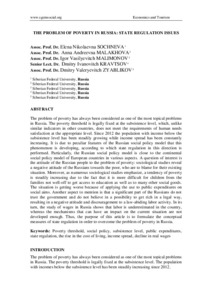THE PROBLEM OF POVERTY IN RUSSIA: STATE REGULATION ISSUES
URI (для ссылок/цитирований):
https://www.sgemworld.at/ssgemlib/spip.php?article4599https://elib.sfu-kras.ru/handle/2311/110727
Автор:
Сочнева, Елена Николаевна
Малахова, Анна Андреевна
Малимонов, Игорь Васильевич
Кравцов, Дмитрий Иванович
Зябликов, Дмитрий Валерьевич
Коллективный автор:
Институт управления бизнес-процессами и экономики
Кафедра теоретических основ экономики
Дата:
2017-10Журнал:
SGEM INTERNATIONAL MULTIDISCIPLINARY SCIENTIFIC CONFERENCE ON SOCIAL SCIENCES AND ARTSКвартиль журнала в Web of Science:
без квартиляБиблиографическое описание:
Сочнева, Елена Николаевна. THE PROBLEM OF POVERTY IN RUSSIA: STATE REGULATION ISSUES [Текст] / Елена Николаевна Сочнева, Анна Андреевна Малахова, Игорь Васильевич Малимонов, Дмитрий Иванович Кравцов, Дмитрий Валерьевич Зябликов // SGEM INTERNATIONAL MULTIDISCIPLINARY SCIENTIFIC CONFERENCE ON SOCIAL SCIENCES AND ARTS: 4th International Multidisciplinary Scientific Conference on Social Sciences and Arts SGEM 2017. — 2017. — Т. 1 (№ 4). — С. 881-8888Текст статьи не публикуется в открытом доступе в соответствии с политикой журнала.
Аннотация:
The problem of poverty has always been considered as one of the most topical problems in Russia. The poverty threshold is legally fixed at the subsistence level, which, unlike similar indicators in other countries, does not meet the requirements of human needs satisfaction at the appropriate level. Since 2012 the population with income below the subsistence level has been steadily growing while income spread has been constantly increasing. It is due to peculiar features of the Russian social policy model that this phenomenon is developing, according to which state regulation in this direction is performed. Particularly, the Russian social policy model is close to the continental social policy model of European countries in various aspects. A question of interest is the attitude of the Russian people to the problem of poverty: sociological studies reveal a negative attitude of the Russians towards the poor, who are to blame for their existing situation. Moreover, as numerous sociological studies emphasize, a tendency of poverty is steadily increasing due to the fact that it is more difficult for children from the families not well-off to get access to education as well as to many other social goods. The situation is getting worse because of applying the axe to public expenditures on social aims. Another aspect to mention is that a significant part of the Russians do not trust the government and do not believe in a possibility to get rich in a legal way, resulting in a negative attitude and discouragement to a law-abiding labor activity. In its turn, the study of wages in Russia shows that labor is underestimated in the country, whereas the mechanisms that can have an impact on the current situation are not developed enough. Thus, the purpose of this article is to formulate the conceptual measures of state regulation in order to overcome the problem of poverty in Russia.

